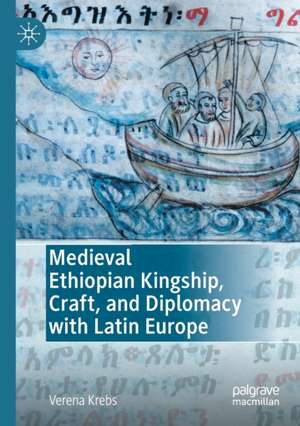Medieval Ethiopian Kingship, Craft, and Diplomacy with Latin Europe
Autor Verena Krebsen Limba Engleză Paperback – 19 mar 2022
| Toate formatele și edițiile | Preț | Express |
|---|---|---|
| Paperback (1) | 640.88 lei 6-8 săpt. | |
| Springer International Publishing – 19 mar 2022 | 640.88 lei 6-8 săpt. | |
| Hardback (1) | 646.30 lei 6-8 săpt. | |
| Springer International Publishing – 18 mar 2021 | 646.30 lei 6-8 săpt. |
Preț: 640.88 lei
Preț vechi: 753.97 lei
-15% Nou
Puncte Express: 961
Preț estimativ în valută:
122.64€ • 126.71$ • 102.02£
122.64€ • 126.71$ • 102.02£
Carte tipărită la comandă
Livrare economică 19 martie-02 aprilie
Preluare comenzi: 021 569.72.76
Specificații
ISBN-13: 9783030649364
ISBN-10: 3030649369
Pagini: 308
Ilustrații: XVII, 308 p. 9 illus.
Dimensiuni: 148 x 210 x 23 mm
Greutate: 0.43 kg
Ediția:1st ed. 2021
Editura: Springer International Publishing
Colecția Palgrave Macmillan
Locul publicării:Cham, Switzerland
ISBN-10: 3030649369
Pagini: 308
Ilustrații: XVII, 308 p. 9 illus.
Dimensiuni: 148 x 210 x 23 mm
Greutate: 0.43 kg
Ediția:1st ed. 2021
Editura: Springer International Publishing
Colecția Palgrave Macmillan
Locul publicării:Cham, Switzerland
Cuprins
1. Introduction .- 2. All the King's Treasures .- 3. The Sons of Dawit .- 4. The Rule of the Regents .- 5. King Solomon’s Heirs .- 6. Conclusion.
Recenzii
“The monograph seeks as a whole to offer a balanced portrayal of Ethiopian – European diplomatic missions at a time when the ties between the Horn of Africa and Europe were increasing. ... In this Krebs has succeeded, and one can well imagine that her book will become a standard reference point on this important chapter in the history of Ethiopian and European relations.” (Philip Michael Forness, Journal of Eastern Christian Studies, Vol. 75 (3-4), 2023)
“This extremely well written book will be the point of reference on this subject. It provides sagacious treatment of the many documents that can be brought to bear on the exchanges, and it places Ethiopia’s part in a new frame of reference.” (Andrew Kurt, Speculum, Vol. 97 (4), October, 2022)
“This is a remarkable and fascinating book that opens up entirely new vistas on the cultural and political history of the fifteenth-century Mediterranean. To someone who is not an expert in Ethiopian history, the book conveys a great sense of authority; it is backed up by a formidable array of footnotes.” (David Abulafia, Al-Masāq, March 28, 2022)
“Krebs has produced an impressive survey of Ethiopian-European relations and her volume will certainly find a place in the library of … Ethiopianists. To be sure, in light of Krebs’s masterful discussion of relics and material culture, readers will certainly look forward to her announced second monograph … .” (Matteo Salvadore, Orientalistische Literaturzeitung, Vol. 116 (4), 2021)
“This extremely well written book will be the point of reference on this subject. It provides sagacious treatment of the many documents that can be brought to bear on the exchanges, and it places Ethiopia’s part in a new frame of reference.” (Andrew Kurt, Speculum, Vol. 97 (4), October, 2022)
“This is a remarkable and fascinating book that opens up entirely new vistas on the cultural and political history of the fifteenth-century Mediterranean. To someone who is not an expert in Ethiopian history, the book conveys a great sense of authority; it is backed up by a formidable array of footnotes.” (David Abulafia, Al-Masāq, March 28, 2022)
“Krebs has produced an impressive survey of Ethiopian-European relations and her volume will certainly find a place in the library of … Ethiopianists. To be sure, in light of Krebs’s masterful discussion of relics and material culture, readers will certainly look forward to her announced second monograph … .” (Matteo Salvadore, Orientalistische Literaturzeitung, Vol. 116 (4), 2021)
Notă biografică
Verena Krebs is Professor for Medieval Cultural Realms and their Entanglements at the Ruhr University Bochum, Germany, where she also co-directs the Bochum Centre for Mediterranean Studies. She holds a bi-national PhD from the universities of Konstanz, Germany, and Mekelle, Ethiopia; her primary research focus is on the late medieval Solomonic Kingdom of Ethiopia and its connections to the wider Mediterranean region.
Textul de pe ultima copertă
This book explores why Ethiopian kings pursued long-distance diplomatic contacts with Latin Europe in the late Middle Ages. It traces the history of more than a dozen embassies dispatched to the Latin West by the kings of Solomonic Ethiopia, a powerful Christian kingdom in the medieval Horn of Africa. Drawing on sources from Europe, Ethiopia, and Egypt, it examines the Ethiopian kings’ motivations for sending out their missions in the fifteenth and early sixteenth centuries – and argues that a desire to acquire religious treasures and foreign artisans drove this early intercontinental diplomacy. Moreover, the Ethiopian initiation of contacts with the distant Christian sphere of Latin Europe appears to have been intimately connected to a local political agenda of building monumental ecclesiastical architecture in the North-East African highlands, and asserted the Ethiopian rulers’ claim of universal kingship and rightful descent from the biblical king Solomon. Shedding new light on theself-identity of a late medieval African dynasty at the height of its power, this book challenges conventional narratives of African-European encounters on the eve of the so-called ‘Age of Exploration'.
Verena Krebs is Professor for Medieval Cultural Realms and their Entanglements at the Ruhr University Bochum, Germany, where she also co-directs the Bochum Centre for Mediterranean Studies. She holds a bi-national PhD from the universities of Konstanz, Germany, and Mekelle, Ethiopia; her primary research focus is on the late medieval Solomonic Kingdom of Ethiopia and its connections to the wider Mediterranean region.
Caracteristici
Explores Ethiopian-European diplomatic encounters in the late Middle Ages Challenges conventional narratives of African-European relations, arguing that African exploration of Europe was driven by aesthetic curiosity rather than military ventures Draws on an extensive corpus of primary sources from Italy and Spain to the Levant and Ethiopia
